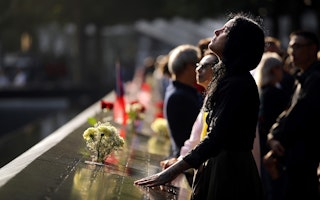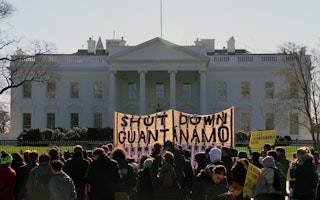New Detention Rules Show Promise and Problems
By Jonathan Horowitz
The following article originally appeared on The Huffington Post.
After years of blundered wartime detention policy, the U.S. military recently revamped its way of deciding who should be detained and released in Afghanistan.
The new system features Detainee Review Boards (DRBs) where detainees appear before a three-member U.S. military panel that determines whether a detainee should be released, detained until his next review in six months, or transferred to Afghan authorities for prosecution or reconciliation.
In March, I had the opportunity to observe five DRBs. One man was alleged to have distributed landmines and provided financial support to the Taliban. Another was detained after allegedly discarding a hand grenade before approaching a military checkpoint. The third was detained for having in his house materials used for making improvised explosive devices. A fourth had alleged links to insurgent commanders. The fifth detainee was captured along the Pakistan border with a group of insurgents. Each DRB lasted one to three hours.
The DRB panel's decision is based on a "preponderance of information" that is provided by the U.S. military, the detainee, and witnesses. The panel's decision is also based on the likelihood of whether a detainee could be reintegrated back into his community without threatening international or Afghan forces. The five detainees are awaiting the panel's decision.
The DRBs have been moving forward at an impressive pace despite limited number of staff. The military is holding DRBs five days a week. The vast majority of detainees have gone through their first review since the new procedures were implemented in September 2009.
The DRBs are held at the new Detention Facility in Parwan (DFIP), which currently holds around 800 detainees. DFIP is located on the outskirts of the Bagram Air Base and is under the full control of the U.S. government. It's a $60 million state of the art facility that has replaced the infamous Bagram Theater Internment Facility, which is now taped off and appears empty.
DRBs are an improvement over the past system, Unlawful Enemy Combatant Review Boards (UECRBs), which had been used since 2005 by the U.S. military at Bagram. But the improvements are relative and the bar was set very low to begin with.
In April 2009, Judge Bates of the U.S. District Court for D.C., described the UECRBs as "plainly less sophisticated and more error-prone" than the Guantanamo Bay detainee review boards - and those review boards were deemed unconstitutional by the Supreme Court:
Unlike the [Guantanamo Bay process], where a petitioner has access to a "personal representative," Bagram detainees represent themselves. Obvious obstacles, including language and cultural differences, obstruct effective self-representation by petitioners such as these. Detainees cannot even speak for themselves; they are only permitted to submit a written statement. But in submitting that statement, detainees do not know what evidence the United States relies upon to justify an "enemy combatant" designation -- so they lack a meaningful opportunity to rebut that evidence. Respondents' far-reaching and everchanging definition of enemy combatant, coupled with the uncertain evidentiary standards, further undercut the reliability of the UECRB review.
Since that decision, the review procedures in Afghanistan have been overhauled to the DRB system. It remains to be seen, however, whether the U.S. has the right combination of procedures to build a fair process that can make an accurate determination relating to a person's detention and freedom.
The rights of the detainee are outlined at the beginning of the hearing when the military panel states, directly and simply: "This is not a criminal trial." The implication is that the detainee won't be convicted of a crime and that the military won't apply many of the essential legal rights found in criminal proceedings in most countries around the world. The detainee isn't entitled to a lawyer and isn't allowed to see all the evidence against him. Evidentiary standards are informal and the detainee's fate is not decided by an independent judge but by a member of the U.S. military--the same institution that detained him.
While the rules are a far cry from the regular system of courtroom checks and balances, the military has tried to address shortcomings by providing detainees with certain rights that were never part of the UECRB in Bagram.
Each detainee is assigned a personal representative--not a lawyer--who can review the classified evidence on their behalf. (The detainee can't review classified evidence.) Detainees are informed of the allegations against them and can, also for the first time, call witnesses to testify on their behalf. DRB policy also explicitly prohibits information obtained under torture from being submitted as evidence.
To increase the presence of witnesses at the DRBs, the U.S. military distributes information in local communities about the DRB procedures. The U.S. also allows detainees to ask their relatives to gather witnesses and documents to support their case. Both of these measures are positive since some former detainees I spoke with complained that they were not notified of their right to call witnesses.
Four of the five DRBs I observed included witnesses, some of whom disputed the government's allegations and others who acted as character witnesses. When the panel asked the witnesses what would happen if the detainee were released, local community elders frequently assured the panel that they would not pose a threat and would be able to find gainful employment.
In the DRB's that I observed, the personal representatives, who according to the DRB policy are obligated to act in the "best interest" of the detainee, felt free to advocate on behalf of a detainee, challenge the factual record, and ensure that the detainee understood the procedures. This is a welcomed change.
However, there are reasons for concern. Serious problems continue to damage the credibility of the new system.
For example, that detainees are not allowed to review classified information seriously jeopardizes the accuracy and legitimacy of the hearings. This classification procedure, though important for protecting identities of informants, makes it nearly impossible for the detainee to effectively challenge the veracity of the allegations.
To solve this problem, the U.S. military and intelligence agencies need to end their culture of over-classification and give greater priority to improving their evidence gathering capacity, as opposed to their intelligence gathering capacity. Without a shift from reliance on secret sources to greater transparency, U.S. detention operations and its detainee review system are doomed. This is not unprecedented; International Security Assistance Forces (ISAF) soldiers, who send their detainees to Afghan authorities, have been given orders to improve evidence collection for Afghan criminal prosecutions.
The U.S. also needs to review its intelligence sources and eliminate those who repeatedly provide false and inaccurate information. One of the biggest complaints Afghans have of the U.S. detention policy is that informants aren't held accountable. In the highly publicized botched night raid by U.S. Special Operations Forces that killed civilians in February, the Christian Science Monitor reported the family as saying, "We want that spy who gave the false information to the Americans...I don't want the spy for myself, I want him to face justice or be handed over to the commander of the [Afghan army] corps."
The DRBs also need more staff, especially personal representatives. If not supplemented, personnel will quickly burn-out and this will severely damage the quality of the DRBs. Currently, there are only eight representatives responsible for reviewing evidence, gathering witnesses, and conducting meetings for 800 detainees.
Also of grave concern is the lack of adequate translation services during DRB proceedings. In the cases I observed, the interpreter at times did not provide a full translation of comments by detainees, witnesses, panel members, personal representatives, or the recorder. Inadequate interpreters should not be allowed to influence a process that determines a person's liberty. Since the DRBs are audio recorded, it would be beneficial for an independent expert to review the tapes and assess the quality of the DRB interpreters. More broadly, U.S. military should conduct a complete review of its Dari and Pashtu interpreters.
Another key problem is that U.S. military personnel aren't well versed in Afghan history, culture, and politics, which is critical in accurate detainee reviews. Mobile ringtones that demonstrate sympathy for the Taliban (yes, they exist); hosting a wedding that Taliban members attend; and an affiliation with an insurgent commander aren't necessarily incriminating in an Afghan context, however are seen as very worrisome behavior by the U.S. military. In the realities of this conflict, Afghans download Taliban ring tones to help them gain safe passage at insurgent checkpoints; insurgents are omnipresent in local community affairs; and insurgent commanders today have been U.S. allies in the past.
To help resolve this problem, U.S. military personnel, especially those involved in detentions, should receive better training on Afghanistan's history, culture, and politics. Afghan legal expertise would also be valuable since the DRB panel, whose members aren't experts in Afghan law, can hand over detainees to Afghan authorities for criminal prosecutions.
Despite all the changes to its detention policies, and the improvements that are still needed, the U.S. remains adamant about handing its DFIP operations to the Afghan government, at which point the Afghan government is likely to start holding criminal trials for the detainees. The transfer date is ambitiously set for January 2011. In reality, it will take place when the U.S. is confident that Afghanistan's justice system is stronger and safe from threats of corruption.
To quicken the pace, the U.S. is setting up a Rule of Law Center at DFIP where it will facilitate the training of Afghan judges, national security prosecutors, investigators, and defense lawyers under Afghan domestic law. If done well, this rule of law program holds considerable potential for strengthening Afghanistan's extremely weak legal system. Afghan officials desperately need to increase their skills in building legal cases and respecting the rights of detainees, such as by respecting the ban on coerced evidence and ensuring detainees enjoy their right to an attorney and fair trial.
As the U.S. moves forward in its various efforts to change the way it conducts detention operations in Afghanistan, it remains unwilling to allow defense lawyers into the DRBs, put non-military personnel on the review panel, or permit detainees to see classified evidence. All weaken the ability of the military to accurately determine who it should detainee and who it should set free.
But these flaws shouldn't cloud the fact that some of the other problem areas can be fixed if tackled appropriately, such as through better evidence collection, not classifying information unnecessarily, improving interpreters, increasing the number of personal representatives, and proper rule of law training for national security detention cases.
Until January 2019, Jonathan Horowitz was a senior legal officer for the Open Society Justice Initiative.


